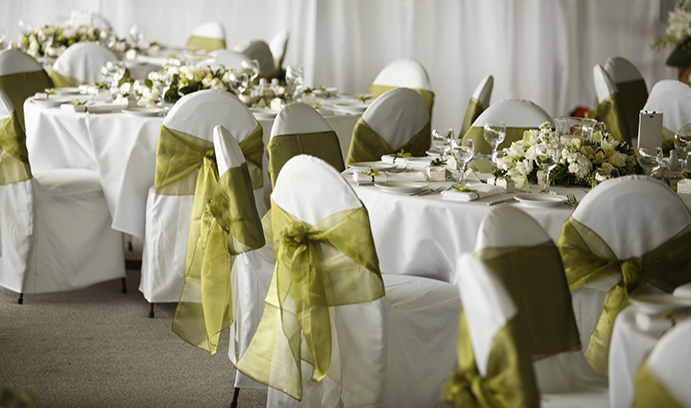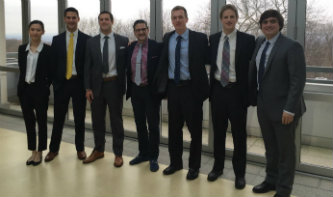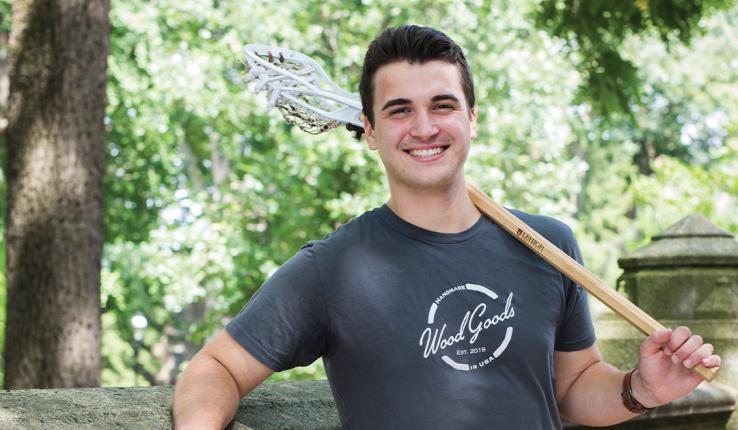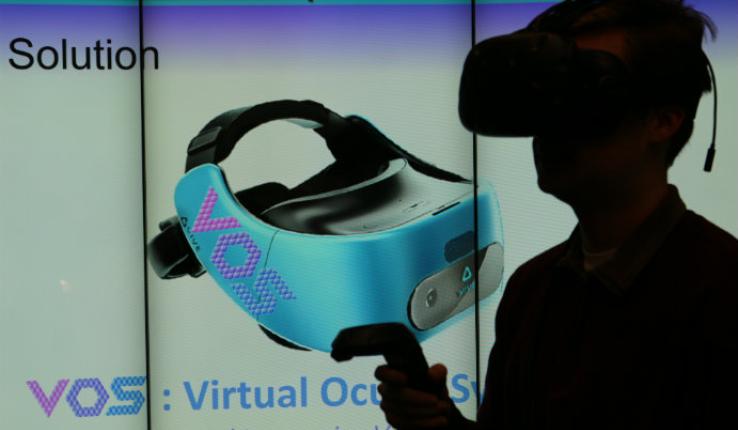The Wedding Hotel

Students in Lehigh’s Integrated Business and Engineering Honors Program spent a year developing the wedding hotel concept.
Weddings are big business.
Joe Volpe, owner and chief executive officer of the Philadelphia-based Cescaphe Event Group, would like to make them even bigger.
Volpe, whose company consistently books lavish ceremonies and receptions two years in advance at five event venues, recognized that a wedding often extends to rehearsal dinners, post-parties and next-day brunches. Many couples also typically book 30 to 35 rooms at nearby hotels to accommodate out-of-town guests.
Could a hotel dedicated entirely to the extended wedding experience help Cescaphe capitalize on the demand for overnight accommodations and pre- and post-wedding events? he wondered.
It could, according to students in Lehigh’s Integrated Business and Engineering Honors Program (IBE). Louis Battaglia ’15, Jose Botran ’15, Tyler Edwards ’15, Tina Lu ’15, Sto Mahoney ’15, Henry Smither ‘15,and Caitlyn Tzou ’15 spent a year developing Volpe’s project into Nuziale, a hotel whose name is Italian for wedding.
An interesting proposal
Offered jointly by the P. C. Rossin College of Engineering and Applied Science and the College of Business and Economics, IBE integrates courses in business and engineering with additional requirements in mathematics, science, English, humanities, and foreign language. The program results in a bachelor of science in integrated business and engineering degree.
In the program’s two-semester, six-credit capstone design course, teams of students work with faculty mentors on the marketing, financial and economic planning, and technical and economic feasibility of actual new product concepts.
In January 2014, at the start of the capstone course, 12 businesses pitched potential assignments to then-juniors Battaglia, Botran, Edwards, Lu, Mahoney, Smither, Tzou and their fellow IBE students.
Cescaphe Event Group’s presentation was particularly impressive—and not only because they provided some signature desserts from their event menu. Their product: Nuziale, the wedding hotel.
“I was blown away by their presentation,” says Mahoney, an industrial engineering major. “What I was most impressed by, though, was their vision for the project. What they were telling me really excited me for this project.”
“It was such a unique and involved problem that was unlike any of the other projects that were presented to us,” says Smither, a finance and civil engineering major. “I knew that my background in civil engineering would be helpful as we worked to design and estimate the costs involved with the structure, and my background in finance would also be beneficial when working on the business side of the venture. Joe had such a passion and vision for the project even from the very beginning. It was hard to not get excited about the project.”
Uniting multiple industries
Cescaphe orchestrates over 600 events annually at its existing venues: Cescaphe Ballroom, Atrium at the Curtis Center, Tendenza, Vie and the Down Town Club. The company maintains consistency in its service with a central kitchen and an in-house trolley company and florist. A hotel would enable it to control even more of the customer experience.
“I had heard several people talk about the IBE program and felt it would be a terrific path forward to bring life to the project through the eyes and imagination of motivated and exceptional students,” says Volpe.
Students discovered early on that there was more to this project than weddings.
“One of the main challenges for this particular project was that it wasn’t just about learning one industry, it was actually about learning two industries,” says Mahoney. “Obviously their core business is weddings, but what Joe was asking us to do was really comprehend what it also means to be in the hotel industry.”
Students spent the first semester doing research. They got to know Cescaphe and its mission and philosophy. They gained a better sense of the market by exploring existing wedding venues that offer overnight accommodations.
Students settled on the boutique-hotel model because of its uniqueness, personality and attention to the customer experience, all of which are in keeping with Cescaphe’s philosophy. As part of their research, the team traveled to New York to stay in two of the city’s highest-rated boutique hotels: the ACE Hotel and the Gramercy Park Hotel. They had the opportunity to dine at Maialino, the Gramercy Park Hotel’s acclaimed on-site Italian restaurant. The fact that President Barack Obama and First Lady Michelle Obama were dining at a nearby table elevated the experience. Students also visited New York’s Greenwich Hotel and met with several professionals in hotel management.
Equipped with extensive multi-industry knowledge, students outlined a plan for Nuziale in Fall 2014.
“This was an entirely comprehensive project,” says Mahoney. “We did all that research for other companies in the first semester, but now in the second semester we had to come up with all of those ideas as they applied to Cescaphe and the vision that they had.”
The team immersed itself in the details. Cescaphe was interested in a particular piece of land in Philadelphia and wanted to explore the possibilities of building from the ground-up.
“This is where the diverse background of our team really helped us excel,” says Battaglia, who studies finance and industrial and systems engineering. “The civil engineers were able to design the structure,the industrial engineers planned how people and resources would move throughout, and the finance students forecasted the financials for the life of the project.”
Students utilized the expertise of Stephen Thode, associate professor of finance and director of Lehigh’s Murray H. Goodman Center for Real Estate Studies, and Mesut Pervizpour, professor of practice of civil engineering. They consulted construction-cost estimator RS Means and a cost-estimating guide published by Hotel Valuation Services for an overview of the necessary fixtures, furniture and equipment for a luxury hotel. The team also created a detailed marketing strategy.
In a comprehensive report and final presentation, the team recommended that Cescaphe build a brand-new, five-story luxury hotel on a pre-selected, 40,000-square-foot lot in Philadelphia’s Northern Liberties neighborhood. The hotel would include 29 standard rooms, two 1,200-square-foot bridal suites, two family suites, a lobby area, a balcony, a drawing room, a lounge or “man cave,” a ceremony room, cocktail hour space, a 6,000-square-foot reception space, and a prep kitchen. Guest rooms would feature high-quality furniture and décor and at 425 square feet would be considerably larger than average hotel rooms.
Students planned the flow of events, from guests’ arrival, complete with valet parking, luggage handling and beverage service, to their departures the following morning after an in-house brunch.
“This was a tough project,” said Pat Costa, professor of practice in the IBE Program, prior to the team’s presentation—known in IBE as a “tiger session”—at Ben Franklin TechVentures on the Mountaintop campus last December. “I can’t speak for Caitlyn or Tina, but I can assure you that these five guys didn’t grow up dreaming about their weddings. So there was a big learning curve for everyone.”
‘Something that could actually work’
Following the student presentation, four seasoned business owners—in this case known as “tigers”—led a conversational inquisition of the team and then praised the students’ work and shared professional insights.
“The reason we call them tigers is that somebody once said after one of these sessions that they felt like they’d been mauled by tigers,” said Costa by way of introduction. “I’m sure there will be no mauling today.”
The “tigers” raised questions about the location of the chosen land, building a new hotel versus renovating an existing structure, the planned layout of the building and the financial viability of a hotel operating at a three-day-per-week utilization rate.
Students responded with confidence in their plan.
“We were really passionate about the fact that this was something Joe could move forward with,” says Edwards. “This was something that could actually work. I think that showed in our presentation and the way we answered the questions.”
“We knew we had done a good job and that we’d answered all their questions to the best of our ability.
Obviously it was still very early in the process of having this project come to fruition, but at that point in time we knew that we had prepared as best we could,” says Mahoney.
Looking to the future
Cescaphe Event Group is in the business of making dreams a reality. In addition to their newly acquired knowledge of weddings and hotels, Lehigh’s IBE tudents apparently know a little bit about that as well.
Volpe was pleased to see his idea transformed into a concrete plan—a dream that could likely come to fruition.
Volpe is in the process of purchasing a defunct power plant building in Philadelphia’s Fishtown neighborhood. He says he intends to “give new life to an abandoned waterfront property… with a one-of-a-kind wedding and event destination for the Philadelphia region.”
“Working with the IBE students was an energizing experience,” says Volpe. “They are smart, inquisitive and eager to learn. Their work was well-thought-through. I was impressed with how quickly they grasped the concepts of the project and transformed these ideas into a working document.”
“There are not many projects that kids in college can say they spent a year working on,” says Edwards.
“We really dove deep and did something that’s real-life. The person we’re working with is actually moving forward with it, taking our advice and using it to build a multi-million-dollar building and using it to run his business.”
“Before this project I never thought that I would be interested in entrepreneurship, but this capstone project was a great experience and it is something that I would consider pursing in the future,” says Tzou, who is currently planning her own wedding.
“We really didn’t know what we were getting ourselves into at first,” says Mahoney. “Little did we know that we were going to have some of the most interesting and also challenging work of our college careers.”
Posted on:





